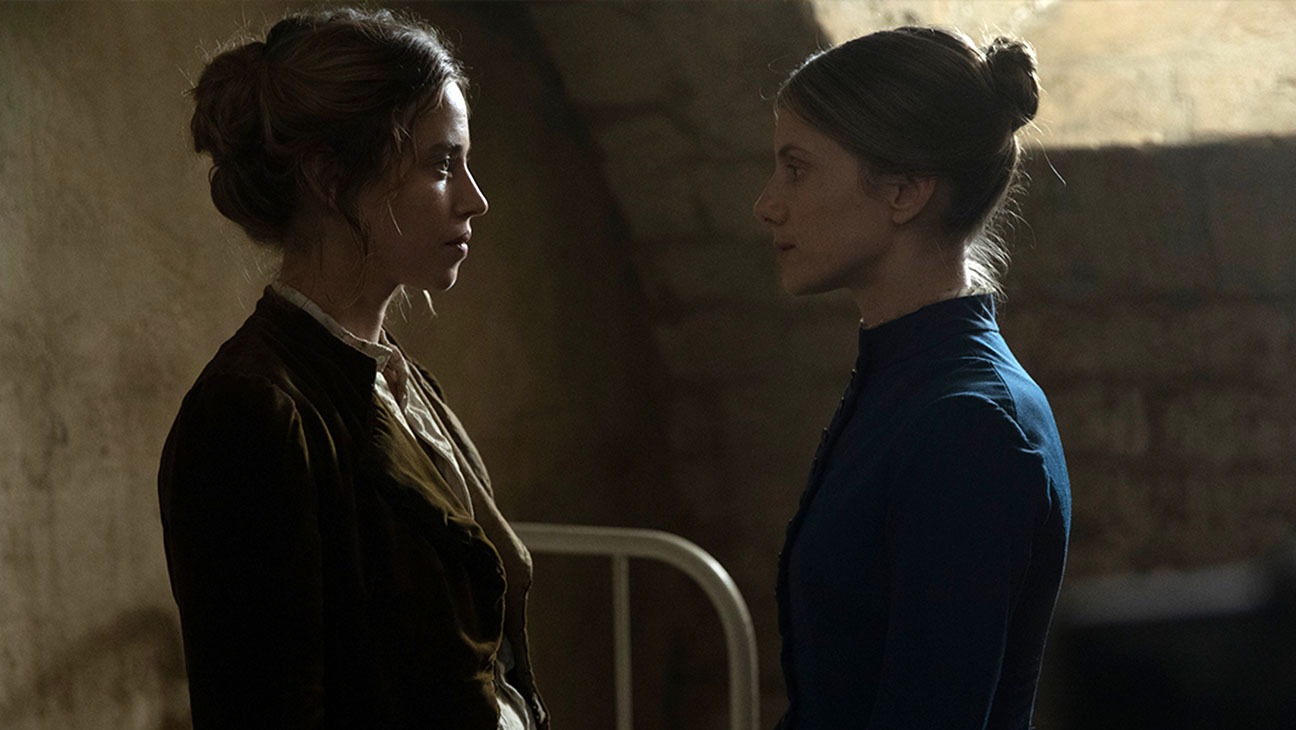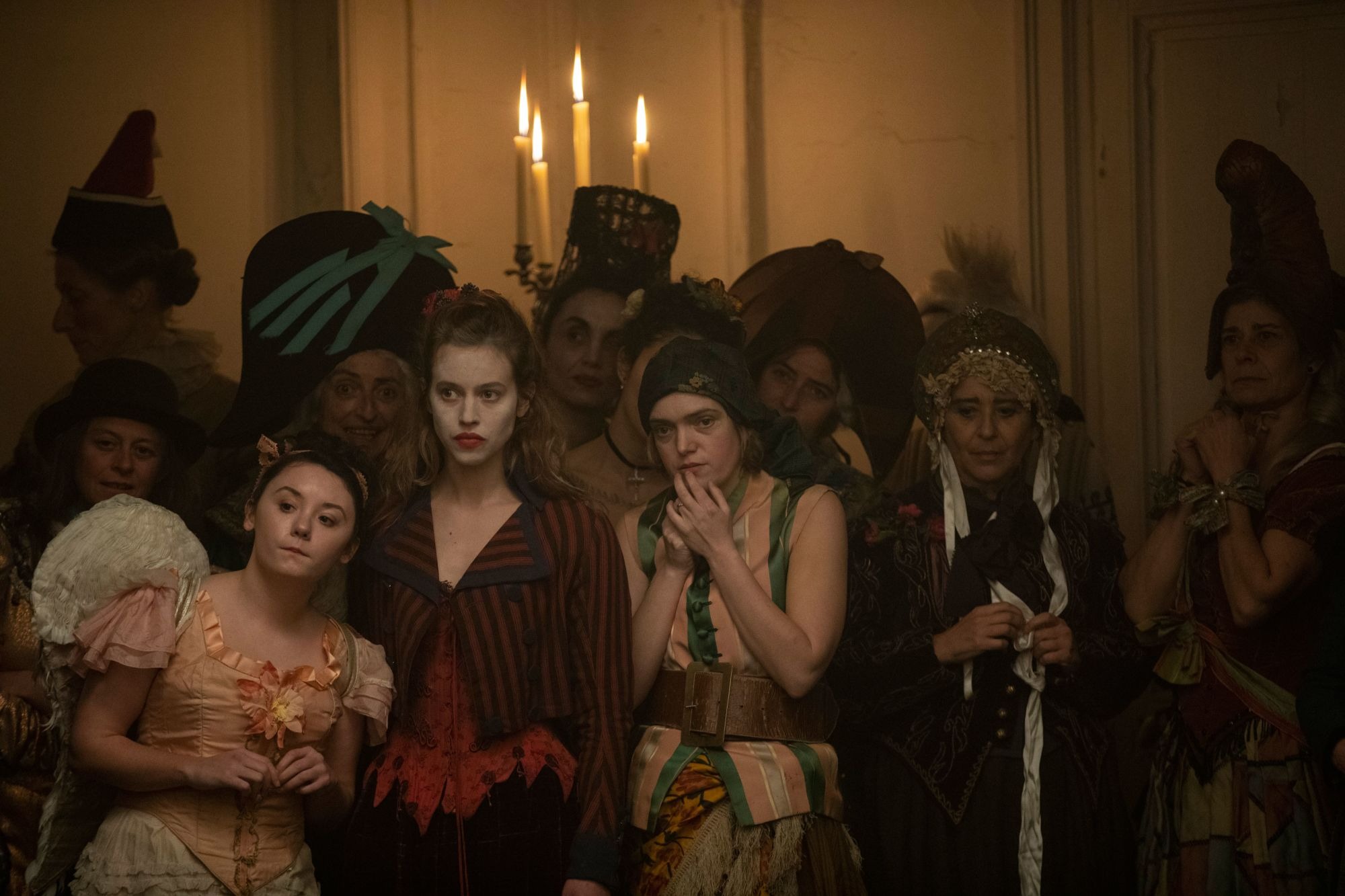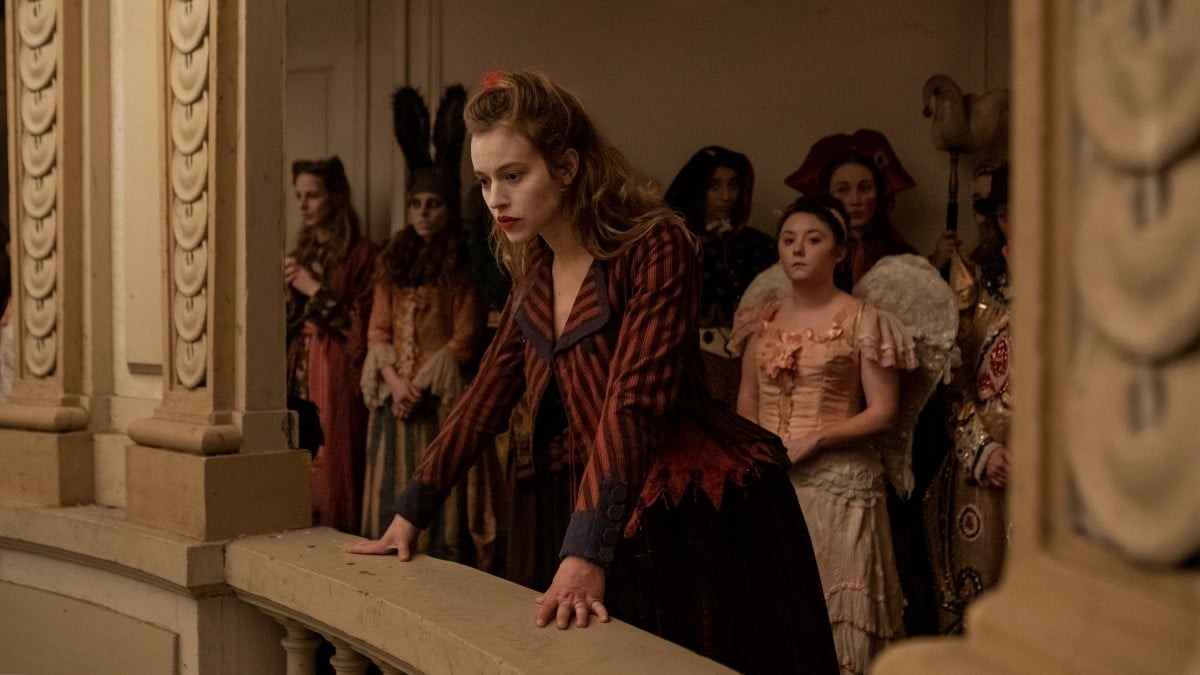Living in a time when societal norms were dictated by men, any deviation from their expectations could result in confinement within a mental institution. The situation becomes even more striking when most of those institutionalized happen to be women.
Inspired by Victoria Mas’s novel Le bal des Folles, The Mad Women’s Ball follows Eugénie Cléry (Lou de Laâge), a twenty-six-year-old woman whose progressive mindset sets her apart.
Passionate about literature, she constantly seeks validation for her views within the pages of books, often leading to conflicts with her father, François Cléry (Cédric Kahn), a rigid French aristocrat.

At the beginning of the film, she deceives her family by claiming to be with a friend when, in reality, she attends the funeral of the renowned French novelist Victor Hugo.
Eugénie’s mother and grandmother embody the traditional roles expected of women in French society, making it difficult for her to confide in them about her thoughts. The only person she truly trusts within her family is her brother, Théophile Cléry (Benjamin Voisin), who remains her steadfast ally.
Eugénie’s Independent Spirit
Eugénie finds solace in cafés, where she immerses herself in books, relishing the freedom of literature. During one of these visits, she encounters a man who playfully engages in conversation before lending her a book.
This particular book, which delves into the existence of spirits, captures her attention, and she is seen revisiting it throughout the film. Its content reinforces her personal belief that spirits are real.
Prone to seizures, Eugénie is convinced that she can perceive spirits. Believing this ability allows her to help others heal, she is open-minded about things that challenge societal norms, such as accepting her brother’s romantic interest in men. She never judges him for his preferences and instead finds joy in seeing him happy with another man.
The Mystery of Eugénie’s Seizures
Only Théophile is aware of her belief in spirits, and he fears for her well-being, knowing that women perceived as different often end up in asylums.
Throughout the movie, no visible spirits or ghosts appear, raising the question of whether Eugénie truly possesses supernatural abilities or if her condition is simply a manifestation of a mental disorder, as her family assumes.
When she reveals to her grandmother that her grandfather’s spirit helped her locate a long-lost pendant, the revelation only reinforces her family’s concerns.
This belief is put to the test when Eugénie is forcibly taken to the Salpêtrière mental asylum. While Eugénie always protected her brother’s secret, he lacked the courage to do the same for her. When she needed his support the most, he failed to stand by her.
Life at Salpêtrière and Geneviève Gleizes
Geneviève Gleizes (Mélanie Laurent), who also directs the film, plays a pivotal role in Eugénie’s life while undergoing a transformation of her own. As the head nurse at Salpêtrière, Geneviève initially remains detached and indifferent.
She ignores the mistreatment of women within the asylum, showing no reaction when Eugénie is stripped naked under the guise of medical examination.
Informing Eugénie that her fate is now in the hands of Dr. Jean-Martin Charcot (Grégoire Bonnet), she upholds the norm of male doctors making decisions for women.
After being assigned to the dormitory, Eugénie befriends another patient named Louise. Geneviève’s attitude begins to move when Eugénie unexpectedly mentions Blandine, Geneviève’s deceased sister.
The revelation unnerves Geneviève, especially when Eugénie shares personal details that only she could have known, including the fact that Geneviève writes letters to her late sister.
That night, Geneviève returns home visibly shaken. She retrieves a box containing numerous letters addressed to Blandine, confirming that Eugénie’s words were not mere coincidence.
Following this encounter, Geneviève’s demeanor toward Eugénie softens. However, she remains powerless when Dr. Charcot labels Eugénie as hysterical simply because she challenges his authority with logical reasoning.
Unable to intervene, she watches as Eugénie is subjected to hydrotherapy, forced to sit in ice-cold water as part of a supposed treatment. This event causes her to view the asylum’s practices through a different lens.
One evening, while heading home, Geneviève notices someone trailing her. It turns out to be Théophile, who pleads with her to deliver Eugénie’s book about spirits. Overcome with guilt for abandoning his sister, he sees this as a small way to make amends.
Geneviève, however, finds herself drawn to the book and spends the entire night reading it. Convinced that she truly communicated with her sister through Eugénie, she begins to question her own perception of reality, which finally leads her father to doubt her sanity. For those who have experienced loss, anything that offers comfort can feel undeniably real.
The Dark Side of Salpêtrière
Though Dr. Charcot enjoys a respected reputation among his peers, his patients view him differently. His arrogance and inhumane treatment turn the women under his care into mere test subjects.
Louise frequently becomes his tool for medical demonstrations, with hospital staff well aware of the deception. During a hypnosis session, he uses a tuning fork to manipulate her, coercing her into inappropriate behavior to fulfill his own twisted interests.
However, he fails to consider that Louise carries deep trauma, having been sexually abused by her uncle. When her aunt placed the blame on her and had her institutionalized, it left lasting scars. Charcot’s methods trigger distressing memories, causing Louise to suffer an epileptic episode that results in partial paralysis.
Dr. Jules, another physician at the asylum, exploits Louise’s vulnerability by leading her to believe he will marry her in exchange for physical intimacy. Many of the women at Salpêtrière are not actually mentally ill.
Some are merely victims of circumstance, while others, like Eugénie, refuse to conform to the restrictive expectations of a patriarchal society.
When she threatens to expose the asylum’s unethical practices after witnessing her friend’s suffering, she is swiftly sedated and placed in isolation for a month.
To prevent her from influencing the other patients, Dr. Charcot assigns the cruel nurse Jeanne to monitor her closely. Jeanne does more than just supervise; she deprives Eugénie of basic necessities, reducing her existence to that of a caged animal awaiting slaughter.
Eugénie’s Escape and the Film’s Ending
After reconnecting with her sister through Eugénie, Geneviève makes the decision to help her escape. She secures Dr. Charcot’s approval to reintegrate Eugénie into the general population after her isolation period and writes to Théophile, urging him to be ready for their plan.
The asylum’s annual ball, where patients are paraded for the amusement of doctors and guests, provides the perfect cover for their escape.

As the evening descends into chaos, it becomes difficult to distinguish between the patients and the drunken doctors who exploit the situation. In a horrifying turn, Dr. Jules, heavily intoxicated, takes advantage of Louise’s paralysis and isolates her in a private chamber.
When another patient witnesses this, she quickly alerts an older resident, Therese. Having spent twenty-five years in the asylum for killing her abusive husband, Therese instinctively tracks down Dr. Jules and violently attacks him. What becomes of him remains uncertain.
Blending in with the crowd, Théophile locates Eugénie, and the two seize their moment to slip away with Geneviève. However, Jeanne remains watchful and, upon realizing their absence, raises the alarm. With many of the attendees too inebriated to react, the escape proceeds unimpeded.
A carriage awaits outside to whisk Eugénie and Théophile to safety, but Geneviève chooses to remain behind. Before parting, she expresses that by aiding Eugénie, she has freed herself from the burden she carried.
By the time Jeanne arrives with reinforcements, the siblings have already vanished. Geneviève’s defiance leads to her being labeled insane and institutionalized herself. Her father refuses to intervene, convinced that prolonged exposure to the asylum’s patients has driven her mad.
Despite this tragic fate, Geneviève finds solace in knowing that Eugénie is finally free. The letters she receives affirm that Eugénie is thriving in a place where she is understood, no longer constrained by societal expectations—liberated both physically and spiritually.



